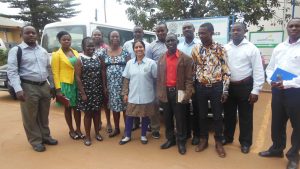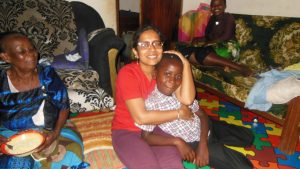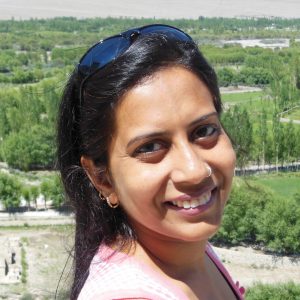
Tapati with her colleagues at the placement organization- ‘The AIDS Support Organization’, Kampala, Uganda
‘Fresh from the field’! …and I’m recently back from Masaka, Uganda after completing the 11 week SPEA abroad program there. I enrolled in this academic service-learning course which offers on-site internship (4-6 credits, SPEA-V 582) during the summer break. The program is governed by School of Public and Environmental Affairs’ (SPEA’s) Advancing Community, Collaboration, and Training (ACCT) program. It is a collaborative arrangement between Indiana University, Foundation for Sustainable Development (FSD), San Francisco & Masaka offices and the local host organization who engages the intern. The program is managed by senior faculties and administrative office housed in SPEA. All full-time students at any of Indiana University’s campuses are eligible to apply. The uniqueness of the program lies in its broad scope of outreach to students, both at their undergraduate or graduate levels; and versatility of ‘fitting’ per the academic needs and domain area choice of the student.
Over the course of my experience and pedagogic learning, I’ve identified myself a social-scientist in community health. Thus while enrolling to the course, I had categorically mentioned my interest of placement at an organization working on public health issues and intentions of carrying out research at theirs’. Otherwise mostly having program interventions through this internship involvement, a ‘research internship’ arrangement was ‘tailored’ to my specificity and ‘trialed’ for the first time, suiting my interests and acumen. Resultant, my placement was at The AIDS Support Organization (TASO), Masaka Centre, Uganda, which works on HIV control and prevention in the country. While the overall internship was managed and mentored by ACCT, FSD and TASO Masaka jointly, technical support for research was mostly provided by TASO, Masaka.
Hence, as you’d note, there were multiple stakeholders/institutions involved to this program, working closely with whom, invigorated my intercultural professional competence, while being rigorously exposed to differing cultural and stakeholder dynamics in a foreign setting.
There were different cost components attached to the program enrollment and completion – tuition, stay and personal expenses (travel and medical). Most of the program and funding application deadlines were due before the summer break. I was lucky to get various scholarships and fellowships which completely funded my study and travel, though that needed much of collage-ing of funds from different funding sources. This was surely time-consuming process, needing rigor and concentration, especially when the proposed research topic, stakeholders and the potential donors thereof, were all, a new arena.

Tapati with her host family, Masaka, Uganda
The course design consisted of induction and learning at SPEA classroom and travelling to Uganda with faculties during the first week, followed by commendable amounts of pedagogic learning during the second week. The readings entailed topics on Participatory Research Appraisal (PRA), Rapid Rural Appraisal (RRA), Appreciative Inquiry (AI), Intercultural Competence, North South partnerships, socio-cultural context of Africanization, etc. and critical overview from Wangari Maathai’s ‘The Challenge for Africa’- Together, a wealth of perspective indeed!!
Another fantastic component to this program was ‘home stay’ for the residual part of the tenure (week 3-10), typically with a family residing in a rural or semi-urban Masaka. Sincerely speaking, there could be no better and direct ways to experience ‘life of the land’ than being in a household setting. It was not just getting a true flavor of the social fabric during this home-stay, but these host families’ being organizationally linked for intern placements since many years now, were absolutely safe abode for the intern.
Being a Muzungu (foreigner, in the local language, Luganda), it surely felt overwhelming at the beginning to know the who’s who, and carry out my proposed research, get used to the local food, but trust, the local stakeholders were keen enough to handhold and advise all through…and by the end of it, you would, I vouch, get used to the Ugandan way of living and know the Ugandan way of functioning!!
Ask me, if this research internship was worth it, and my answer would be an emphatic ‘YES’ with certain mantras – begin early with your preparations, be persevere with very differing and at times slow revert communication, especially from the African counterparts; and ready to ‘work hard’ during the ‘summer break’, with an African dream !!
 Tapati is a socio-behavioral scientist in community health. She is currently in her second year doctoral studies at the School of Public Health and majoring in Health Behavior. Her research emphasis is on multi-level community engagement in health policies, particularly in resource-limited country settings. Whenever she can take a breather from her pedagogic assignments, she engages in painting or creative writing.
Tapati is a socio-behavioral scientist in community health. She is currently in her second year doctoral studies at the School of Public Health and majoring in Health Behavior. Her research emphasis is on multi-level community engagement in health policies, particularly in resource-limited country settings. Whenever she can take a breather from her pedagogic assignments, she engages in painting or creative writing.



